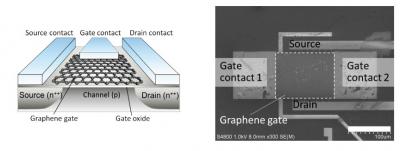Researchers from Fujitsu present a new novel graphene-enhanced gas sensor device. The graphene has been employed as gate electrode for an n-channel silicon transistor. The researchers report that the sensor exhibits sensitivities that are more than one order of magnitde better than conventional resistivity-based graphene gas sensors - easily detecting 7 ppb of No2.

When the graphene gate is exposed and gas molecules adsorb on the graphene surface, the work function of graphene changes depending on the gas species and concentrations, thus changing the threshold of the silicon transistor. The work function of the graphene-gate can be controlled by intentionally depositing proper doping materials on graphene, changing the threshold by up to 620 mV without degrading the sub threshold properties.
The researchers also say that since graphene is also a good barrier layer, it can be an excellent candidate for metal gates for advanced MOSFETs.
This work will be first presented at the IEEE IEDM 2016 conference.

